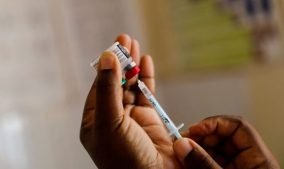New research from the country’s top medical scientists shows that people infected with the variant of the coronavirus found in South Africa have developed a level of immunity against that variant and possibly other mutations of the coronavirus as well. That is according to the KwaZulu-Natal Research, Innovation and Sequencing Platform (Krisp).
Krisp on Wednesday held a joint online media briefing with the National Institute for Communicable Diseases (NICD), the National Health Laboratory Services, the Health Department, and the Department of Higher Education, Science, and Innovation.
The new variant, which was initially detected in South Africa, is now found in 48 countries.
Here is an explanation about the variant:
The 501Y.V2 strain has nine different mutations.
Through a joint effort between Krisp, NICD, and universities across the country, laboratories submitted samples from patients that were infected with both the initial variant and the 501Y.V2 strain.
The tests measured the neutralisation of 44 people that were infected in both the first and second waves of the COVID-19 pandemic. It has found that the 501Y.V2 variant was able to neutralise itself from other variants, including the variant which circulated in the first wave, thus providing a level of immunity to itself and other variants.
“We saw a substantial loss of neutralisation, a mindful reduction in average data, which is essentially a measure of how well neutralising antibodies can prevent a virus from infecting a cell. What this means is that neutralising antibodies elicited by the new variant are somehow different in their ability to recognise, not only their own virus but other viruses. This is potentially good news. Unlike the antibodies that were triggered by the initial variant, these antibodies have a little bit more breadth,” says NICD’s Professor Penny Moore.
Scientists say COVID-19 variant found in SA offers immunity: Tulio De Oliveira:
Research to help fight new variants
A genomics team, led by Krisp, was responsible for detecting the 501Y.V2 variant last year. This variant has claimed the bulk of the more than 50 000 COVID-19 deaths that have been recorded in South Africa.
Krisp Director, Professor Tulio de Oliveira, says this information is key to fighting new variants.
“Genomic surveillance is a critical component of the epidemic response. One thing that is shown in the new results, the plasma collected from people infected with the new variant had good neutralising activity against itself and also against the first wave virus and other variants of concern. It means that people infected (have) some immunity against the variant and other lineages. We know that immunity can decrease over time. In no way, are we saying that these people should not vaccinate. We should increase vaccination to avoid rapid death wave.”
Briefing on latest scientific results on COVID-19 variant in SA:
Findings to help develop a vaccine
Chairperson of the Ministerial Advisory Council, Professor Salim Abdool Karim, says that the groundbreaking findings can be used to develop a vaccine to protect against the 501Y.V2 and other future strains.
“When we say that this new variant is able to generate immunity, that it’s quite potent against itself and against other variants that we have been able to test, that is fundamentally saying, if a vaccine is built on this new variant’s strain capabilities, we can expect that there is a good chance that, that vaccine will elicit good immune responses that will protect people from getting 501Y.V2. Such a vaccine has already been made by Moderna, Pfizer is doing similarly, AstraZeneca is doing the same and Johnson and Johnson.”
Scientists have warned that COVID-19 will continue to mutate.
Professor Tulio de Oliveira says that South Africa has the tools to detect new variants and that the government has given Krisp R25-million for further genomic research on the characteristics of variants.






